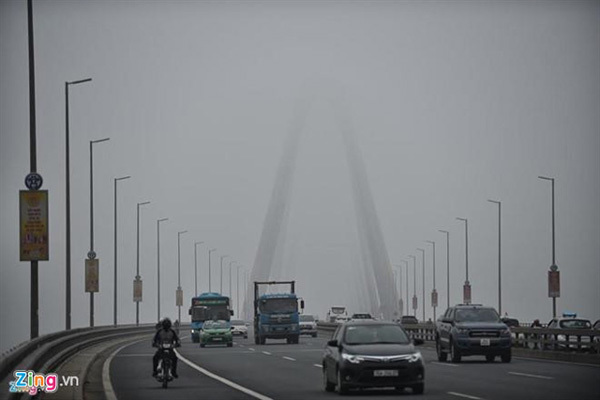Hanoi to focus on air quality monitoring
Red alarm on air quality: will Hanoi become another Beijing?
 |
| Vietnam’s air quality is reaching hazardous levels and is seriously affecting residents’ health.— Photo zing.vn |
Nguyen Trong An, deputy director of the Research and Training Centre for Community Development and also coordinator of the Viet Nam Non-communicable Prevention Alliance, made the statement at a conference held on Thursday in Hanoi.
The conference, about the benefits of sustainable power development together with air quality and community health, was co-organised by the US Agency for International Development (USAID), the Live & Learn for Environment and Community, the Green Innovation and Development Centre and the Independent Institute for Environmental Issues.
An said air pollution in Vietnam was caused by a number of factors, and the most serious was PM2.5, the atmospheric particulate matter (PM) that had a diameter of less than 2.5 micrometres.
It could accumulate in the lungs causing asthma, respiratory problems and heart disease, he said.
About seven million fatalities are reportedly caused by air pollution each year, according to the World Health Organisation.
In Vietnam, more than 60,000 people died in 2016 from heart disease, strokes, lung cancer and lung diseases related to air pollution, according to the Ministry of Health.
However, many people are not aware of air pollution’s effect on health, said An.
Hanoi’s air quality has improved over the past three years, however, air pollution still remains at a high level.
Air pollution was reported at most air monitoring stations, especially on main roads such as Minh Khai and Pham Van Dong.
The 2018 World Air Quality Report ranked Hanoi as the second most polluted city in Southeast Asia, and the 209th out of more than 3,000 cities in the world. HCM City ranks 15th and the 455th, respectively.
To improve the situation, An proposed individuals and families should minimise emission sources that cause air pollution such as traditional coal stoves.
More trees should be planted and solar energy should be used more, he said.
Nguyen Thi Lan Anh, a reporter from the Tuổi trẻ (Youth) newspaper, said in Seoul, when the PM density reached 50 microgrammes per cubic metre, the municipal air management division would call an urgent meeting to discuss coping measures.
Messages will be sent to residents with warnings about affected areas and necessary preventive measures.
Tickets for public vehicles will be offered for free during rush hour.
Vehicles entering the inner city will be limited based on their number plates, she said.
VNS
 Vietnam’s air quality is reaching hazardous levels and is seriously affecting residents’ health.
Vietnam’s air quality is reaching hazardous levels and is seriously affecting residents’ health.